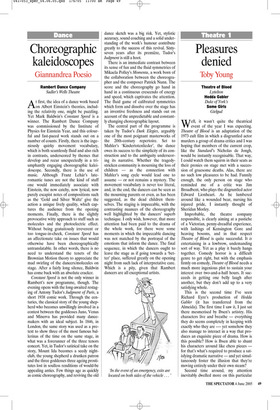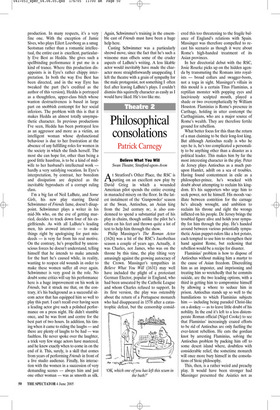Pleasures denied
Toby Young
Theatre of Blood Lyttelton Hedda Gabler Duke of York’s Some Girls Gielgud
Well, it wasn’t quite the theatrical event of the year I was expecting. Theatre of Blood is an adaptation of the 1973 cult film in which a disgruntled actor murders a group of drama critics and I was hoping that members of the current crop, like the Standard’s Nicholas de Jongh, would be instantly recognisable. That way, I could watch them squirm in their seats as their proxies on stage met with a succession of gruesome deaths. Alas, there are no such low pleasures to be had. Funnily enough, the only person on stage who reminded me of a critic was Jim Broadbent, who plays the disgruntled actor Edward Lionheart. As he lumbered around like a wounded bear, nursing his injured pride, I instantly thought of Sheridan Morley.
Improbable, the theatre company responsible, is clearly aiming at a pastiche of a Victorian, penny-dreadful experience, with lashings of Kensington Gore and heaving bosoms, and in that respect Theatre of Blood is quite successful. It is entertaining in a lowbrow, undemanding sort of way. Yet as a play it barely hangs together. Comedy horror is a difficult genre to get right, but with the emphasis firmly on comedy, Theatre of Blood needs a much more ingenious plot to sustain your interest over two-and-a-half hours. It succeeds in getting one belly laugh after another, but they don’t add up to a very satisfying whole.
This is the second time I’ve seen Richard Eyre’s production of Hedda Gabler (it has transferred from the Almeida). The first time I saw it, I just sat there mesmerised by Ibsen’s artistry. His characters live and breathe — everything they do seems completely in keeping with exactly who they are -— yet somehow they also manage to interact in a way that produces an exquisite piece of drama. How is this possible? How is Ibsen able to shunt his characters around like chess pieces for that’s what’s required to produce a satisfying dramatic narrative — and yet simultaneously foster the illusion that they’re moving entirely under their own steam?
Second time around, my attention inevitably dwelled more on this particular production. In many respects, it’s a very fine one. With the exception of Jamie Sives, who plays Eilert Loevborg as a smug Scotsman rather than a romantic intellectual, the entire cast is excellent, particularly Eve Best as Hedda. She gives such a spellbinding performance it put me in a kind of trance. Where this production disappoints is in Eyre’s rather chippy interpretation. In both the way Eve Best has been directed, and in the way Eyre has tweaked the part (he’s credited as the author of this version), Hedda is portrayed as a thoughtless, upper-class bitch whose wanton destructiveness is based in large part on snobbish contempt for her social inferiors. The problem with this is that it makes Hedda an almost totally unsympathetic character. In previous productions I’ve seen, Hedda has been portrayed less as an aggressor and more as a victim, an intelligent woman whose dysfunctional behaviour is due to her frustration at the absence of any fulfilling roles for women in the society in which she finds herself. The most she can hope for, other than being a good little hausfrau, is to be a kind of midwife to her husband’s intellectual work hardly a very satisfying vocation. In Eyre’s interpretation, by contrast, her boredom and dissipation are depicted as the inevitable byproducts of a corrupt ruling class.
I’m a big fan of Neil LaBute, and Some Girls, his new play starring David Schwimmer of Friends fame, doesn’t disappoint. Schwimmer plays a writer in his mid-30s who, on the eve of getting married, decides to track down four of his exgirlfriends. As with all LaBute’s leading men, his avowed intention — to make things right by apologising for past misdeeds — is very far from his real motive. On the contrary, he’s propelled by unconscious forces he doesn’t understand, telling himself that he intends to make amends for the hurt he’s caused while, in reality, wanting to reopen old wounds in order to make these women suffer all over again. Schwimmer is very good in the role. No doubt some critics will say his performance here is a huge improvement on his work in Friends, but it struck me that, on the contrary, it’s his background as a successful sitcom actor that has equipped him so well to play this part. I can’t recall ever having seen a leading actor give such a polished performance on a press night. He didn’t stumble once, and he was front and centre for the best part of two hours. In addition, his timing when it came to riding the laughs — and there are plenty of laughs to be had — was faultless. He never spoke over the laughter, a trick very few stage actors have mastered, and he knew exactly when to come in on the end of it. This, surely, is a skill that comes from years of performing Friends in front of a live studio audience. Finally, his interaction with the women in a succession of very demanding scenes — always him and just one other woman — was as smooth as silk. Again, Schwimmer’s training in the ensemble cast of Friends must have been a huge help here.
Casting Schwimmer was a particularly shrewd move, since the fact that he’s such a winsome man offsets some of the cruder aspects of LaBute’s writing. A less likable actor would inevitably have made the character more straightforwardly unappealing. I left the theatre with a grain of sympathy for the male protagonist, not something I often feel after leaving LaBute’s plays. I couldn’t dismiss this squirrelly character as easily as I would have liked. He’s too like me.



















































 Previous page
Previous page